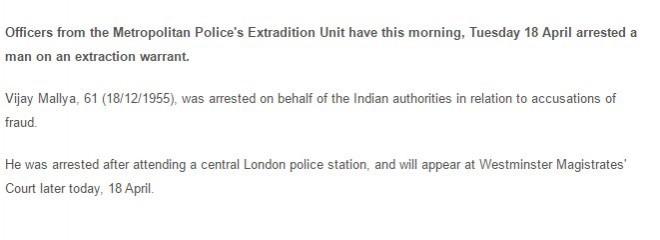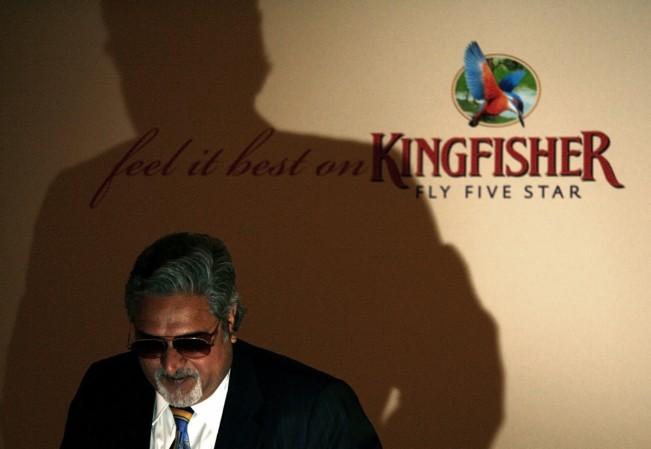
Industrialist Vijay Mallya was arrested by the Scotland Yard on Tuesday (April 18) morning (UK local time) "on an extradition warrant" on behalf of the Indian authorities on charges of fraud. Mallya was produced before the Westminster Magistrate's Court on Tuesday. The court granted him bail three hours after his arrest and also fixed a date for the next hearing.
India had formally sent an extradition request for Mallya on February 8 through a note verbale in accordance with the Mutual Legal Assistance Treaty (MLAT) between India and the UK. India had, while sending the request, asserted that it has a "legitimate" case against the industrialist and that if the extradition request was honoured, it would show British "sensitivity towards our concerns."
The British government had started Mallya's extradition process last month with the country's secretary of state certifying India's request and sending it to a district judge for further action.

Extradition Process
The rather-long extradition process in the UK begins with a decision by the judge as to whether the arrest warrant should be issued. If the warrant is issued, the person concerned is taken into custody and produced before a court for preliminary hearing.
The court, later, sets dates for the next hearing where the prosecution/complainant nation presents prima facie evidence against the accused. The court takes this evidence into consideration in deciding the fate of the accused. If the court deems the prima facie evidence as "satisfactory", the extradition process is set in motion.
However, it is believed that the accused has the right to appeal to the higher courts, including the UK's Supreme Court, against the lower court's decision.
The Indian government is seeing the progress in Mallya's case (arrest) as a huge victory. However, it now depends on the Central Bureau of Investigation (CBI) and the Enforcement Directorate (ED) to present a strong case against the industrialist and convince the UK courts so that he can be brought back to India, where the actual trial will begin. However, the extradition process could take time with Mallya expected to appeal against the charges in the higher courts of the UK.
If he now tries to leave the UK without prior permission of the courts, Mallya will be in bigger trouble as he will not only be an offender in the eyes of the Indian laws but also those of the UK. The Indian government had initially requested the UK to deport Mallya to India but the request was denied since the industrialist had a UK visa and therefore, could legally stay in London.

Charges Against Mallya
Mallya's now-defunct Kingfisher Airlines owes over Rs 9,000 crore to a group of banks like the State Bank of India, Punjab National Bank, IDBI Bank, Bank of Baroda, Allahabad Bank, Federal Bank and Axis Bank, among others.
In January 2017, a CBI court had issued a non-bailable warrant against Mallya in a Rs 900-crore IDBI Bank loan default case of 2009. Around Rs 250 crore of the Rs 900-crore loan, which was given to buy aircraft parts, was diverted abroad. The CBI had also arrested nine officials of Kingfisher Airlines and IDBI Bank Ltd, including the bank's former chief.
In September 2016, the ED had issued an order, under the Prevention of Money Laundering Act (PMLA), to attach several of Mallya's properties including flats, a farmhouse, shares and fixed deposits to the tune of Rs 6,630 crore.
The Indian government had also revoked Mallya's passport in September 2016. The ED had said that Mallya did not intend to come back to India and that his passport was revoked due to his conduct. The industrialist failed to appear in court despite several summons by the central government.









!['Had denied Housefull franchise as they wanted me to wear a bikini': Tia Bajpai on turning down bold scripts [Exclusive]](https://data1.ibtimes.co.in/en/full/806605/had-denied-housefull-franchise-they-wanted-me-wear-bikini-tia-bajpai-turning-down-bold.png?w=220&h=138)



